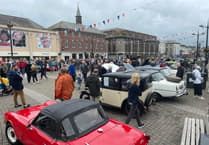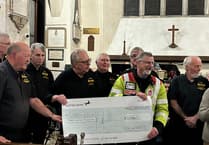In the opening chapter of Homesick, Catrina Davies’ breakthrough work of 2019, the author describes her horror on returning to the West Penwith shed that has become her home – humble and ramshackle, but home nonetheless – only to discover it has been ransacked. Among the stolen items is her laptop, including several months’ work, not backed up – just gone.
“I try not to think about the folders full of notes and research, the clippings and quotes and thoughts and sentences and paragraphs that are gone forever,” she writes. “Maybe this is the universe trying to tell me my life in the shed is not viable.”
Fast-forward a few years, and Davies is still living in a shed near St Just, albeit a one large enough to accommodate her partner and their young son – “My shed was too small for one, let alone three” – and the work in question has finally been published.
Once Upon A Raven’s Nest is the story of a life: that of Hedley Ralph Collard, born and bred on Exmoor, and of his inextricable and often contradictory connection with the land. Renamed Thomas Hedley in the book, his life span echoes that of the era Davies feels has shaped our planet, destroyed it even: the Anthropocene, otherwise known as the period during which the impact of human activity has increased exponentially and caused noticeable detrimental change.
These parallel occurrences have been painstakingly interwoven in a structure that jumps between past and present, punctuated by alarming facts and significant events in the development of climate change since the 1950s: the 50-fold increase in the production of manmade substances; the loss of half the world’s coral reefs and two-thirds of their biodiversity; the discovery of a huge hole in the ozone layer in 1985, and the urban population exceeding the rural for the first time in human history in 2007.
At the heart of the book is the friendship between Davies and Hedley, formed towards the end of his life by which time a machinery accident had left him tetraplegic. The pair had met in Wales, when Davies was house-sitting for Hedley’s partner’s parents; having befriended the family, she was asked to stay with Hedley in his partner’s absence. “It was well out of my comfort zone, but I felt I couldn’t say no,” she recalls.
She was quickly captivated by his tales of working-class country life in Winsford, near Dulverton. These were meticulously recorded and transcribed onto the laptop; Hedley obligingly revisited them when it was stolen. For him, they were simply reminiscences and anecdotes, delivered in no particular order and curated by Davies, who describes the work as “a portrait, not a biography”.
She hadn’t intended to turn it into a book, but “there was so much material, four years’ worth of work, I thought I should. It gave him a nice focus.”
Hedley starts as a sensitive child, who throughout his life delights in nature. Later, he decries the use of fertiliser, which Davies tells us has jumped from 40m tonnes to 280m since 1950: “When I was a boy, nobody ever planted until the moon was growing. These days, farmers wouldn’t see the moon if it was hanging off the end of their nose.”
How to square this with his obvious love of machinery, from tractors and chainsaws to the quad-bike that eventually does for him? “It’s a fascinating contradiction, and I thought it was a good metaphor for the world,” says Davies. “It reminded me of how we are pushing hard and breaking things, of the macho energy that causes the damage. He came from a generation of men who were taught to be unemotional. You have to be, to cause the damage we have done.”
Davies feels this contradiction is symptomatic of society: that we can’t help but be part of the problem. “I’m the same: I’m trying to look after my son and being a good person and not get depressed. That involves destroying the world because of the culture we live in. It’s hard to accept or even see it, and I don’t think we are responsible in that sense – we’re trapped.”
Once Upon… is written in a dialect that makes the words jump from the page like an audiobook. “I tried writing it in the third person, but it didn’t work – I had to do it in his voice, and I felt I could just about pull it off,” says Davies. “I thought the language was beautiful, and I wanted to keep his turns of phrase.”
It’s so real, it’s hard not to think of people you know (especially from older generations) who are just like Hedley: hot-headed, straight-talking, no-nonsense, all-knowing. Tough, but fragile – just like nature.
Hedley heard the first draft before he died, and before Davies sold it. Did he like it? “I trust he knew the making of this book was an act of love,” she says in the preface. She adds: “It’s quite daunting working with other people and telling their story. I was walking a line between making sure he liked it and that I was something I liked too.”
In contrast, Homesick told her own story. Living in a shed was a result of the housing crisis in its earlier days; Homesick explored the topic arguably before anyone else. While the topic has long been hot in Cornwall, with its second homes and proliferation of Airbnb rentals, the situation has worsened exponentially since publication, with house prices sky-high and rental availability and affordability at a crushing low.
“I get quite angry when talking about houses – it’s a stark reminder of how unequal it all is, and that you can’t afford to be poor anymore,” she says.
“After covid, I travelled around the country and was surprised how many people had the same experience and felt the same, especially in touristy places such as the Lake District. Now there are lots of books, and people talk about it all the time. I feel I can move on.”
Not that she no longer has an opinion: far from it. Second homes? “In Cornwall, we should price them out of reality, tax them so much it’s not worth it.” Airbnbs? “You should have to have a licence for one, and the licences given out only when all the people on the waiting list have been housed.” House prices/rents? “Link them to the average local wage.”
It’s not rocket science: “It’s simple stuff but it’s a different agenda. It’s about people being housed rather than your mates making money.” She laughs wryly.
What kind of a world would she like for her son? “I’d like a world where nature restoration is front and centre of all policy, every decision made with the impact on the natural world as a top priority – because it is.”
One Upon A Raven’s Nest is published by Quercus, £18.99 (hardback).
Catrina Davies will be in conversation with Raynor Winn at the Falmouth Book Festival, on Sunday at 2pm at The Poly. Tickets £8. www.falmouthbookfestival.com




